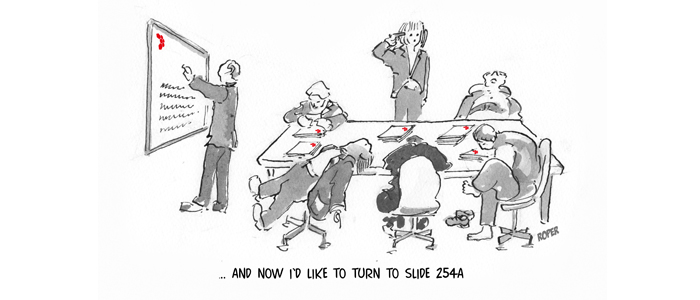Some of the most important work you ever do is done in meetings, so set some clear groundrules to be able to work more effectively together.
“Any committee that is the slightest use is composed of people who are too busy to want to sit on it for a second longer than they have to.”
Katharine Whitehorn
In far too many organisations, we see meetings where people arrive late and unprepared. Sometimes participants openly check their emails, or even answer their phone and leave the room for a while to take a call! Even where gadgets are switched off, people are frequently not listening to each other. They talk over each other, interrupt or start side conversations while someone is speaking.
Practices like these damage relationships and hinder productivity. They betray the presence of unconscious attitudes and beliefs such as:
- “I don’t see the point of this meeting”
- “I’ve got far too much to do to be here”
- “My attention is not needed for this bit / this bit is boring – I’ll tune back in when we are talking about something more interesting (to me)”
- “I feel threatened; I have to defend myself / my function / my profession at all costs”
Sometimes meetings have no clear agenda, or only a simple list of topics to be discussed with no indication of the intended outcome. And all too often people leave with no idea of what exactly is to be done, and by whom. So nothing happens, and all that time and effort comes to nothing.
What’s the alternative?
How would it be instead if:
- Every person in the meeting knows exactly why they are there and what their contribution is expected to be.
- Only the right people are there.
- Everybody turns up in good time, fully prepared.
- Everyone switches off their phone for the duration of the meeting.
- All listen fully and without interrupting to each person speaking.
- People tell the truth without fear of reprisals.
- You can trust others to keep their word.
- There is a clear agenda, with clear objectives for each item.
- Actions with a deadline date are assigned to named individuals for every decision made.
- The meeting finishes on time.
Many organisations start their cultural revolution by working hard at transforming the quality and quantity of outcomes from their meetings. To have constructive meeting practices become ‘just the way we do things round here’, you need to do some conscious design work. Some of the most important work you ever do is done in meetings – so spend some time making sure that they are as effective and efficient as possible.

